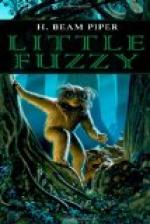“Well, we have the Holloway Fuzzies placed on Xerxes,” the Chief Justice said. “We can hear the testimony of the people who worked with them there at any time. Now, I want to hear from Dr. Ernst Mallin.”
Coombes was on his feet again. “Your Honors, before any further testimony is heard, I would like to confer with my client privately.”
“I fail to see any reason why we should interrupt proceedings for that purpose, Mr. Coombes. You can confer as much as you wish with your client after this session, and I can assure you that you will be called upon to do nothing on his behalf until then.” He gave a light tap with his gavel and then said: “Dr. Ernst Mallin will please take the stand.”
XV
Ernst Mallin shrank, as though trying to pull himself into himself, when he heard his name. He didn’t want to testify. He had been dreading this moment for days. Now he would have to sit in that chair, and they would ask him questions, and he couldn’t answer them truthfully and the globe over his head—
When the deputy marshal touched his shoulder and spoke to him, he didn’t think, at first, that his legs would support him. It seemed miles, with all the staring faces on either side of him. Somehow, he reached the chair and sat down, and they fitted the helmet over his head and attached the electrodes. They used to make a witness take some kind of an oath to tell the truth. They didn’t any more. They didn’t need to.
As soon as the veridicator was on, he looked up at the big screen behind the three judges; the globe above his head was a glaring red. There was a titter of laughter. Nobody in the Courtroom knew better than he what was happening. He had screens in his laboratory that broke it all down into individual patterns—the steady pulsing waves from the cortex, the alpha and beta waves; beta-aleph and beta-beth and beta-gimel and beta-daleth. The thalamic waves. He thought of all of them, and of the electromagnetic events which accompanied brain activity. As he did, the red faded and the globe became blue. He was no longer suppressing statements and substituting other statements he knew to be false. If he could keep it that way. But, sooner or later, he knew, he wouldn’t be able to.
The globe stayed blue while he named himself and stated his professional background. There was a brief flicker of red while he was listing his publication—that paper, entirely the work of one of his students, which he had published under his own name. He had forgotten about that, but his conscience hadn’t.
“Dr. Mallin,” the oldest of the three judges, who sat in the middle, began, “what, in your professional opinion, is the difference between sapient and nonsapient mentation?”
“The ability to think consciously,” he stated. The globe stayed blue.
“Do you mean that nonsapient animals aren’t conscious, or do you mean they don’t think?”




